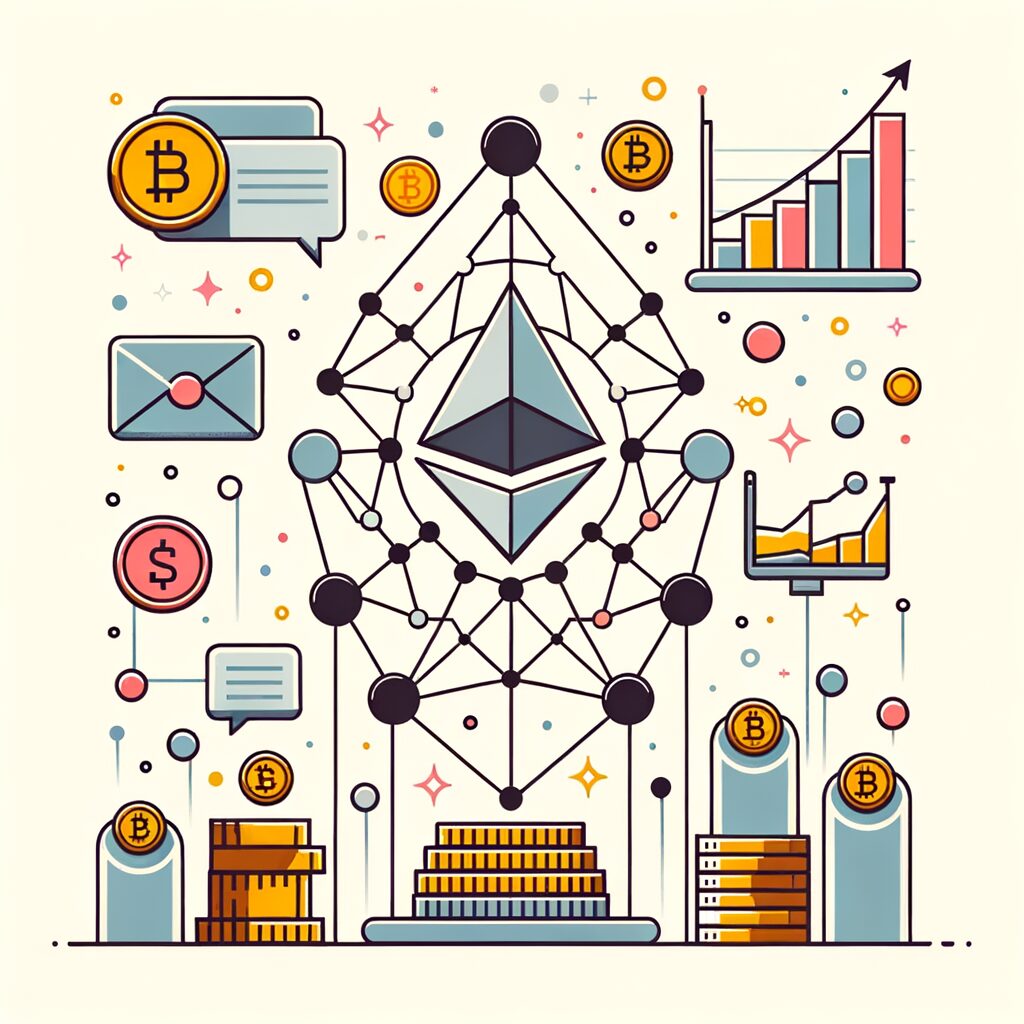
“Empower Your Wealth: Invest in the Future with Decentralized Finance”
The Rise of Decentralized Finance: Exploring Investment Opportunities in Blockchain Projects
The Rise of Decentralized Finance: Exploring Investment Opportunities in Blockchain Projects
In recent years, the financial landscape has witnessed a paradigm shift with the advent of decentralized finance (DeFi), a blockchain-based form of finance that operates without the need for traditional financial intermediaries such as banks, brokerages, or exchanges. This burgeoning sector has not only challenged conventional financial systems but has also opened up a plethora of investment opportunities for those looking to diversify their portfolios with digital assets and innovative financial products.
At the heart of DeFi is the concept of smart contracts, self-executing contracts with the terms of the agreement directly written into code. These contracts run on decentralized platforms, primarily Ethereum, and are immutable and transparent, ensuring that all parties can trust the outcome without the need for a central authority. The implications of this technology are profound, as it allows for the creation of a wide range of financial services, including lending, borrowing, trading, and risk management, all accessible to anyone with an internet connection.
Investors have taken keen interest in DeFi projects due to their potential for high returns, driven by the novelty of the technology and the rapid growth of the sector. Liquidity mining, yield farming, and staking are some of the mechanisms through which investors can earn returns on their investments in DeFi. These methods often offer significantly higher interest rates compared to traditional savings accounts or fixed-income investments, albeit with a higher risk profile.
Moreover, the tokenization of assets has become a cornerstone of DeFi, allowing for the creation of digital representations of real-world assets on the blockchain. This innovation has led to the emergence of new investment products such as tokenized stocks, commodities, and even real estate, providing investors with exposure to a variety of asset classes in a decentralized and borderless manner. The liquidity and fractional ownership enabled by tokenization have democratized access to investments that were previously out of reach for the average person.
Despite the exciting opportunities, investing in DeFi is not without its challenges. The nascent industry is highly volatile and subject to regulatory uncertainty. The lack of oversight that allows for innovation and freedom in DeFi also opens the door to risks such as smart contract vulnerabilities, scams, and market manipulation. Therefore, investors must conduct thorough due diligence and possess a solid understanding of blockchain technology and the specific protocols in which they invest.
Furthermore, as the DeFi space matures, it is attracting attention from institutional investors and traditional financial entities looking to harness the benefits of blockchain technology. This influx of capital and expertise is likely to spur further innovation, increase liquidity, and enhance the stability of DeFi platforms. It also suggests a growing recognition of the legitimacy and potential of decentralized financial systems.
In conclusion, the rise of decentralized finance represents a significant evolution in the way individuals and institutions can access and interact with financial services. For investors, DeFi offers a new frontier with a wealth of opportunities to explore. However, it is imperative to approach these investments with caution, armed with knowledge and an appreciation for the risks involved. As the ecosystem continues to develop and integrate with traditional finance, the potential for DeFi to reshape the financial industry is becoming increasingly clear, promising a future where finance is more open, inclusive, and efficient.
Navigating the Ecosystem of Decentralized Applications: A Guide for Innovative Investors

Investments in decentralized financial products have emerged as a groundbreaking development in the financial sector, offering a plethora of opportunities for innovative investors. As we navigate the ecosystem of decentralized applications (dApps), it is crucial to understand the transformative potential these tools possess and the unique considerations they entail.
Decentralized finance, or DeFi, represents a shift from traditional, centralized financial systems to peer-to-peer finance enabled by decentralized technologies built on blockchain. This paradigm shift is not merely a technological innovation; it is a reimagining of financial transactions that emphasizes transparency, accessibility, and inclusivity. At the heart of DeFi is the promise of a financial system where intermediaries such as banks and brokers are no longer necessary, thereby reducing costs and increasing efficiency.
The allure of DeFi products lies in their ability to provide services such as lending, borrowing, trading, and earning interest on assets, all without the need for a central authority. Smart contracts—self-executing contracts with the terms of the agreement directly written into code—serve as the backbone of DeFi, automating transactions and ensuring compliance without human intervention. This automation not only minimizes the risk of error but also provides a level of security and trust that is difficult to achieve in traditional financial systems.
However, the journey into the DeFi space is not without its challenges. The nascent nature of the technology means that regulatory frameworks are still evolving, and the lack of oversight can pose risks to the uninitiated. Moreover, the decentralized aspect of these applications means that users must take full responsibility for their investments, as there is no central entity to turn to in case of errors or disputes. Therefore, due diligence becomes paramount when exploring DeFi products.
Investors interested in DeFi must familiarize themselves with the various platforms and protocols that make up the ecosystem. Ethereum, for instance, has been a frontrunner in the DeFi space, with a majority of dApps built on its blockchain. However, other blockchains like Binance Smart Chain, Solana, and Polkadot are also gaining traction, offering different features and benefits. Each platform has its own set of rules, supported assets, and security measures, which investors must carefully evaluate to align with their investment goals and risk tolerance.
Liquidity is another critical factor to consider. In decentralized exchanges (DEXs), liquidity pools are used to facilitate trading between different cryptocurrency pairs. Investors can provide liquidity to these pools and, in return, receive a portion of the transaction fees as a reward. While this can be a lucrative opportunity, it also exposes investors to risks such as impermanent loss, which occurs when the price of the deposited assets changes compared to when they were deposited.
The potential for high returns in DeFi is undeniable, but it is accompanied by a proportional level of risk. The volatility of cryptocurrencies, coupled with the experimental nature of many DeFi projects, means that investors must approach these opportunities with caution. It is advisable to start with smaller investments and gradually increase exposure as one gains more experience and confidence in navigating the DeFi landscape.
In conclusion, investments in decentralized financial products represent a significant advancement in the democratization of finance. As we delve into the ecosystem of decentralized applications, it is imperative for innovative investors to arm themselves with knowledge, exercise prudence, and remain vigilant about the evolving landscape. With the right approach, DeFi can offer a new frontier for financial growth and innovation.
Cryptocurrencies and Beyond: Investing in the Development of Decentralized Financial Products
As the world of finance evolves, the emergence of decentralized financial products, often referred to as DeFi, has become a focal point for investors seeking alternatives to traditional banking systems. DeFi extends the blockchain's utility beyond simple asset transfer to more complex financial use cases. By leveraging the inherent benefits of blockchain technology, such as transparency, security, and immutability, DeFi applications aim to recreate and improve upon the existing financial system.
Investments in decentralized financial products represent a paradigm shift in how individuals can access and interact with financial services. Unlike traditional finance, DeFi platforms operate without central authorities, such as banks or clearinghouses, and instead use smart contracts on blockchains like Ethereum to automate transactions and enforce terms. This innovation has led to the creation of a wide range of financial instruments, including lending protocols, decentralized exchanges, stablecoins, and yield farming opportunities, all of which are accessible to anyone with an internet connection.
The allure of DeFi lies in its potential to offer more inclusive financial services. By removing intermediaries, DeFi reduces transaction costs and increases efficiency, allowing users to retain more control over their financial dealings. Moreover, the open-source nature of DeFi projects encourages continuous development and innovation, as community members can propose enhancements and vote on governance decisions. This collaborative approach has accelerated the pace of innovation within the DeFi space, leading to rapid growth and the introduction of novel financial products.
However, investing in decentralized financial products is not without its risks. The nascent nature of DeFi means that the market is highly volatile and subject to regulatory uncertainty. Smart contract vulnerabilities have led to significant losses in the past, and the lack of a centralized authority can make it difficult to resolve disputes or recover funds. As such, investors must conduct thorough due diligence and possess a solid understanding of the underlying technology and associated risks before committing capital to DeFi projects.
Despite these challenges, the potential rewards of DeFi investments can be substantial. Yield farming, for instance, has emerged as a popular strategy for earning returns on cryptocurrency holdings. By providing liquidity to DeFi protocols, investors can earn interest or governance tokens, which may appreciate in value as the protocol grows. Additionally, the tokenization of assets in DeFi opens up possibilities for fractional ownership and increased liquidity for a variety of asset classes, including real estate and art.
The future of decentralized financial products is closely tied to the broader adoption of blockchain technology and the regulatory landscape. As more users become comfortable with blockchain and cryptocurrencies, the demand for DeFi services is likely to grow. Furthermore, as regulators around the world begin to understand and address the unique aspects of DeFi, clearer guidelines could lead to increased investor confidence and participation.
In conclusion, investments in decentralized financial products offer a compelling opportunity for those looking to diversify their portfolios and engage with the cutting edge of financial technology. While the risks associated with DeFi should not be underestimated, the potential for innovation and democratization of financial services makes it an area of significant interest for forward-thinking investors. As the DeFi ecosystem continues to mature, it may well redefine the very fabric of the global financial system, making now an exciting time to be involved in its development.
The Future of Finance: How Decentralization is Driving Investment in Blockchain Innovation
The Future of Finance: How Decentralization is Driving Investment in Blockchain Innovation
In the ever-evolving landscape of finance, decentralization has emerged as a transformative force, propelling a wave of innovation that is reshaping the way we think about and interact with financial products. At the heart of this revolution lies blockchain technology, a decentralized ledger that offers transparency, security, and efficiency. As traditional financial systems grapple with the limitations of centralized control, blockchain's decentralized financial products, or DeFi, are attracting significant investment, signaling a paradigm shift in the future of finance.
DeFi extends beyond the foundational cryptocurrency transactions for which blockchain is widely known. It encompasses a broad range of financial services, including lending, borrowing, trading, and insurance, all operating on a peer-to-peer network that eliminates the need for intermediaries such as banks and brokers. This disintermediation is not merely a technical novelty; it represents a profound democratization of finance, granting greater access to financial services for a global population often underserved by conventional banking systems.
Investors are taking note of the potential that DeFi holds. The allure of higher yields, increased transparency, and enhanced security is drawing both retail and institutional investors into the space. Moreover, the programmable nature of smart contracts—self-executing contracts with the terms of the agreement directly written into code—has opened up new avenues for innovation in financial products. These contracts execute automatically when certain conditions are met, reducing the risk of fraud and default, and further fueling investor confidence.
The investment pouring into DeFi is not only a testament to its current appeal but also an investment in its future potential. As blockchain technology matures, the scalability and interoperability of DeFi platforms are expected to improve, broadening their applicability and user base. This growth is anticipated to be exponential, as the network effects of increased adoption enhance the value and utility of decentralized financial services.
However, the journey towards a fully decentralized financial ecosystem is not without its challenges. Regulatory uncertainty looms large, with governments and financial authorities around the world grappling with how to oversee a system designed to operate without central oversight. The nascent nature of the technology also means that security risks, such as smart contract vulnerabilities and the potential for systemic failures, remain a concern for investors.
Despite these challenges, the momentum behind DeFi is undeniable. The promise of a more inclusive, efficient, and secure financial system is driving innovation at a breakneck pace. As traditional financial institutions begin to recognize the potential of blockchain, partnerships between legacy banks and DeFi platforms are emerging, further legitimizing the space and accelerating its integration into the mainstream financial ecosystem.
In conclusion, the investment landscape within decentralized finance is a testament to the transformative power of blockchain technology. As DeFi continues to grow and mature, it is poised to redefine the very fabric of the financial sector. The influx of capital into this space is not merely chasing the latest trend; it is a forward-looking bet on a more democratized, transparent, and efficient financial future. As such, the trajectory of DeFi investment is not just a fleeting phenomenon but a harbinger of the enduring changes that decentralization is set to imprint on the world of finance.


